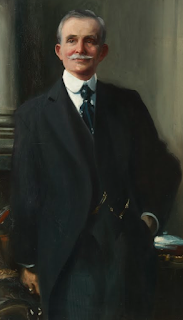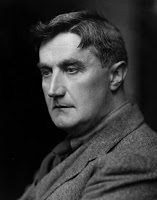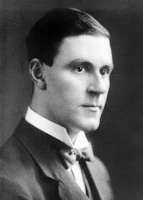Cécilia Tsan and friends play Bridge, Dale, Vaughan Williams, Ireland and Babajanian at Mason House
JOHN STODDER
I’ve been going to chamber music concerts at Mason House in West Los Angeles since the series began in the mid-2010s, so the musicians who regularly perform there have become familiar. Two of my favorites, cellist Cécilia Tsan and violinist Ambroise Aubrun, joined a newcomer, pianist Zachary Deak, for a trio concert on March 18 with the improbable, yet dead-on accurate, title of "English and Armenian Masterworks."
 |
| Arno Babajanian (1921-1983). |
For this review, I will start at the middle and work back to the beginning, because the concert was really two distinct experiences—two very different journeys. The works presented in the English half of the program sounded very "English”, in that each of the four featured composers created musical statements that, at least implicitly, reflected their culture. However, the single work in the Armenian half, Arno Babajanian’s
Piano Trio in F-sharp minor (1952), was immersed in the tragic spirit of that nation and its embattled history.
One might say that compared to most nationalities, the English wear their collective identity lightly, having been secure, wealthy and powerful for so much of their mystique-clouded history. The English works presented at Mason House were, as one might expect, succinct and delectable, lyrical yet restrained, crafted to delight the ear and evoke nature and magic, but with hints of sadness here and yearning there, disturbance heard from a distance, or behind a veil.
 |
| Location of Armenia (left, red) within the Soviet Union. |
By contrast, Armenian history is characterized by struggles, disasters and defeats, and it is a poor country today as a result of the historical flow of events it has had to bear. The weight of history, loss and hard-earned pessimism was fully expressed by Babajanian’s work, which the trio played with brilliance and enthusiasm, mastering its fierceness as well as its tenderness. Their joy in being able to present our audience with a piece of music they each clearly loved was palpable. On at least two occasions Aubrun shot looks at Tsan, and then to the audience, that seemed meant to convey, “
Buckle your seatbelts...” ahead of passages that just floored me with their stark beauty and candor.
Those who knew and had come to cherish this relatively obscure piece, including host Todd Mason, had let us know before the performance began that it was special to them; that we were in for something exceptional. Indeed, this
Piano Trio seems to have made Babajanian’s reputation in Armenia, which during his lifetime was part of the Soviet Union, which named him a People’s Artist of the USSR in 1971.
After hearing the fan worship, it was initially surprising that the first movement presented such a bleak picture: dolorous tunes constantly interrupting themselves, the strings duetting on a melancholy theme that abruptly crashed and burned, the players’ bows metamorphosing into weapons against the strings, and then a brief intrusion of silence. The sad melodies returned via a gorgeous, stately piano solo passage that steered into more intense emoting from the strings.
At around this time, I found myself scribbling in a notebook, “A burdened soul’s brave struggle to speak its heart and tell its broken history.” At the impressive climax of the first movement, it seemed like this burdened soul was about to uncover the truth—and then with a single pizzicato strum, the movement abruptly terminated.
The second movement was even better.
We had to wait an agonizing extra moment for it. It unfolded slowly, first with a solo violin, then a pulsing, ominous piano section, then joined by the cello, fading in like an apparition. More powerfully emotional playing flowed from Aubrun and Tsan; they whipped up waves of feeling, bolstered by Deak’s stately, continuous piano, escorting the crying and whispering string voices down a steep hill, through a fierce, ever-changing storm. This sublime movement was the highlight of the night’s concert; you could feel how the Mason House audience’s collective breath was taken away by it.
 |
| Ambroise Aubrun, Zachary Deak, and Cécilia Tsan. |
The
Allegro vivace finale, almost light-hearted, was a jolting contrast. At times, it put me in mind of a Saturday night barn dance deep in the woods, a night of relief and community fellowship for the “burdened souls” we met in the first two movements. The voices of the three instruments melded into an ensemble, creating an orchestral feel. The sense of fate pressing down was lifted; the music occupied a larger space. But as the movement’s end approached, you could feel another change was coming, whether a darker night or a new storm, or just the gravitational pull of fate. The final moments were completely satisfying; “
A socko ending” I wrote in my notebook.
 |
| Walter W. Cobbett (1847-1937). |
The English first half of the program was fascinating, especially after David Brown’s pre-concert remarks explaining the origin of the Elizabethan “fantasia,” described by the English composer Thomas Morley in 1597 as “
when a musician taketh a point at his pleasure and wresteth and turneth it as he list, making either much or little of it according to as shall seeme best in his own conceit.”
Brown explained that, much later, around the turn of the last century, a wealthy amateur violinist and music patron named Walter Willson Cobbett, having heard lectures and performances of 16th and 17th century fantasias at Gresham College in London, decided the form needed to be revived. Cobbett’s inspiration came at a time when British concert works had become overly influenced by the great continental composers—Beethoven, Mendelssohn, Brahms, etc.—and their favored forms, such as sonatas and symphonies.
Cobbett decided that the fantasia, which he preferred to spell as “phantasy” or “phantasie,” could be a uniquely English form—a trend he could enforce by an act of will through establishing an annual Phantasy Competition for composers, and funding the prizes. The contest, which was first held in 1905, was only open to British subjects. Two of the pieces we heard on March 18 at Mason House were entrants in the second contest held two years later: Frank Bridges’ Phantasie in C minor H. 71 (1907) and John Ireland’s Phantasie in A Minor (1906).
 |
| Vaughan Williams, c.1921. |
The other two featured British composers, Ralph Vaughan Williams and Benjamin Dale, both received later “phantasie” commissions from Cobbett, but not for the works we heard at Mason House. Dale's brief, wistful "
Prunella" (1917), for violin and piano, was written while the composer was incarcerated—along with thousands of civilian compatriots caught in Germany at the outbreak of World War 1—at the Ruhleben internment camp near Berlin.
 |
| Benjamin Dale. |
To most classical audiences in the U.S., Vaughan Williams is the most familiar of the four. Like many of his works,
Six Studies in English Folk Song, for cello and piano (1926) was inspired by his years collecting English folk songs and dances. Vaughan Williams’ explorations with the folk traditions of his nation were paralleled by other great composers of the early 20th century, like Bartók, Ravel, Gershwin and Stravinsky, who searched for inspiration and authenticity in the music of the villages and streets.
 |
| Frank Bridge. |
Each of the work's six brief movements had song titles that suggested narratives, such as “
She Borrowed Some of Her Mother’s Gold” or “
The Lady and the Dragoon.” With the exception of the final piece, all of the songs had a melancholic and nostalgic feeling, as if they were stories of broken hearts and bad luck. But the
Allegro vivace that concluded this suite was busy and clever, an anecdote set to music.
.jpg) |
| John Ireland. |
The two
Phantasies also delivered many highlights. Deak discovered a beautiful tone in a piano solo in the first section of Ireland’s brooding work. Bridge’s piece, which opened the concert, could have been illustrated by stills from the movie
Mrs. Miniver. The music was bucolic and romantic, its lyricism bordering on melancholy—but keeping a stiff upper lip. It was playful, but yearning to be free. Tsan’s cello and Aubrun’s violin conveyed both the power and excitement of shifting moods in changing weather.
Throughout the evening the three players couldn’t have worked harder. The music in both halves of the show called upon them at various points to dig in and play loudly and forcefully, and then to dial it back. Their generosity and energy were awe-inspiring, and I will be forever grateful to Ambroise Aubrun, Cécilia Tsan, and Zachary Deak for introducing me to all these unfamiliar and compelling compositions.
 |
| l-r: Ambroise Aubrun, Todd Mason, Zachary Deak, Cécilia Tsan, David Brown. |
---ooo---
Mason Home Concert, 3484 Redwood Ave., Mar Vista, CA 90066, 6:00 p.m., Saturday, March 18, 2023.







.jpg)
















No comments:
Post a Comment